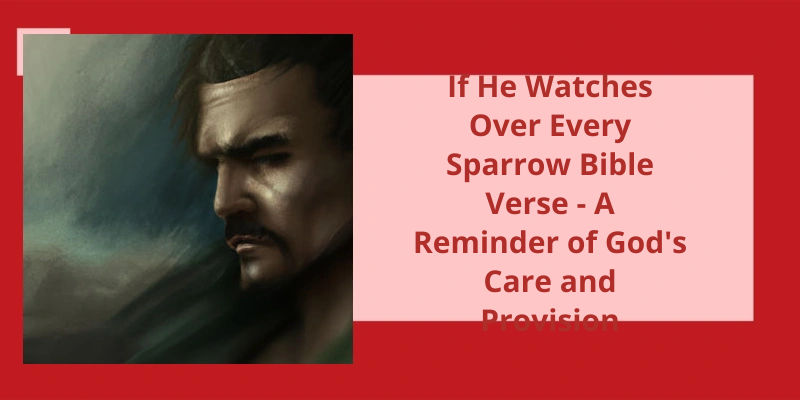The Bible is a book filled with wisdom and guidance for all aspects of life. One verse that provides comfort and reassurance is Matthew 10:31, which speaks about God's faithfulness in caring for all His creations, even the smallest and seemingly insignificant ones, such as sparrows. The verse reminds us that if God watches over every sparrow, He’s surely watching over us too, and loves us even more. This message is a source of hope and strength for Christians, as it highlights the depth of God's love and care for His people. The verse has inspired many to create Christian-themed products, such as the "If He Watches Over Every Sparrow" Matthew 10:31 Christian Shirt, which serves as a reminder of God's unfailing love and protection.
Where in the Bible Does It Say He Watches Over the Sparrow?
The phrase “His eye is on the sparrow” comes from the Gospel of Matthew in the New Testament. In Matthew 10:29-31, Jesus is speaking to his disciples and explaining that God cares for every living creature, including birds. He says, “Aren’t two sparrows sold for a penny? Yet not one of them will fall to the ground outside your Fathers care. And even the very hairs of your head are all numbered. So don’t be afraid; you’re worth more than many sparrows.”
This passage is a reminder of Gods love and care for all of creation, including humans and animals. It shows that no matter how small or insignificant we may feel, God is always watching over us and protecting us. This is a comforting thought, especially during difficult times when we may feel alone or forgotten.
The idea that God watches over the sparrow has been a source of inspiration for many people over the years, and it’s been referenced in numerous songs and hymns. It serves as a reminder that even the smallest and most seemingly insignificant creatures are important to God, and that we should treat all living things with kindness and respect.
The Role of Animals in Biblical Stories and Their Significance in Religious Teachings.
- The serpent in the Garden of Eden tempted Eve to eat the forbidden fruit, leading to the expulsion of humans from Paradise.
- Noah was instructed by God to build an ark and bring pairs of every kind of animal on board during the great flood.
- In the story of Jonah and the whale, a large fish swallows the prophet Jonah and eventually spits him out onto dry land to fulfill his mission from God.
- Samson famously uses the jawbone of a donkey to defeat the Philistines, showing that even the lowliest of creatures can be used for God’s purposes.
- In the Book of Job, God uses a series of wild animals (including a lion, a raven, and a wild ox) to illustrate his power and might to Job.
- Many of Jesus’ parables involve animals, such as the Good Shepherd, the lost sheep, the mustard seed (which grows into a tree that birds can nest in), and the wise and foolish builders.
This concept of divine intervention and the idea that every action is monitored by a higher power has been a topic of debate for centuries. While some people find comfort in the thought that someone is watching out for them, others like Didion dismiss the notion as wishful thinking. Let’s explore further what “no eye on the sparrow” really means and why it matters to some.
What Does No Eye on the Sparrow Mean?
Instead, she asserts that it’s up to each individual to take responsibility for their own life and not rely on the whims of a higher power.
For Didion, no eye on the sparrow means that there’s no divine plan or purpose for ones life. It’s easy to fall into the trap of believing that someone or something is in control, but this can lead to a sense of helplessness and a lack of agency. By recognizing that there’s no eye on the sparrow, one can take ownership of their life and make the choices that will lead to their own success.
Instead, she sees it as a call to action, a reminder that we must take responsibility for our own lives and make choices that will lead us towards success and fulfillment. Ultimately, it’s up to each individual to create their own destiny, rather than relying on the whims of fate or a divine being.
The Psalms are a collection of sacred hymns and prayers that have been treasured by people of different faiths for generations. One of the most beautiful passages in the book of Psalms celebrates the sparrow, a small bird that’s often overlooked but plays an important role in the natural world. In this article, we will explore the significance of the sparrow in Psalms 84 and what this passage can teach us about faith and hope.
What Bible Verse Is the Sparrow in Psalms?
Psalms 84 is a beautiful piece of poetry that speaks about the beauty of the temple of the Lord. In the first few verses, the psalmist marvels at the beauty of Gods dwelling place and is filled with longing to be there. It’s a soaring piece of literature, and it speaks of the spiritual connection between God and man.
One of the most famous verses from Psalms 84 is verse 3 – Even the sparrow has found a home, and the swallow a nest for herself, where she may have her young— a place near your altar, LORD Almighty, my King, and my God. This verse is often quoted in sermons and other religious contexts as an example of the care that God has for even the smallest creatures in his creation.
The sparrow and the swallow are both small, unremarkable birds, yet they’ve found a home near the altar of God. This is a powerful metaphor for the way that God cares for all of his creatures, no matter how small or insignificant they may seem. It’s a reminder that Gods love extends to all of his creation, from the tiniest sparrow to the greatest human being.
This verse has been interpreted in many different ways over the centuries. Some see it as a symbol of the humble devotion that one should have to God, while others see it as a promise of protection for those who seek refuge in the Lord. Whatever the interpretation, it’s clear that this verse has resonated with Christians for centuries and has become a beloved part of the religious lexicon.
In a world that can often seem chaotic and frightening, the psalmists words offer a reminder that God is always watching over us, just as he watches over the sparrow and the swallow. It’s a message of hope and comfort that’s brought solace to countless believers over the years, and it continues to inspire and uplift people today.
The Symbolism of the Sparrow and Swallow in Christian Literature and Art
- The sparrow symbolizes God’s love and care for even the smallest creatures, as mentioned in Matthew 10:29-31.
- The swallow is associated with spring and resurrection, likely stemming from it’s annual migration and return.
- Both birds are featured in Christian art, often depicting scenes from the life of Christ.
- They can also be seen as symbols of hope and faith, as they’re known for their resilience and ability to adapt to changing environments.
- Overall, the sparrow and swallow serve as reminders of God’s presence and power in both the natural world and in our own lives.
This iconic gospel hymn has been sung by countless artists and continues to inspire listeners with it’s message of faith and perseverance. But beyond it’s musical and cultural significance, many wonder about the origins and meaning behind the song. So where does “His Eye Is on the Sparrow” come from? Let’s take a closer look.
Where Does His Eye Is on the Sparrow Come From?
The lyrics of “His Eye Is on the Sparrow” are based on two passages from the Bible: Matthew 10:29-31 and Luke 12:6-Both passages speak of Gods care for even the smallest and seemingly most insignificant creatures, such as sparrows. The songs refrain reflects this sentiment with the lines, “I sing because Im happy, I sing because Im free, For His eye is on the sparrow, And I know He watches me.”
The origins of the songs composition are rooted in a personal tragedy experienced by Civilla D. Martin. In 1904, Martin received a letter from a friend who’d lost her husband. The friends closing lines – “His eye is on the sparrow, and I know He watches me” – inspired Martin to write the hymn. It’s said that Martin completed the lyrics in less than 30 minutes, and the song was first published the following year.
In addition to Ethel Waters and Mahalia Jackson, notable recordings have been made by Whitney Houston, Lauryn Hill, and Gladys Knight. The song has also been used in popular culture, including in the films Sister Act 2: Back in the Habit and Malcolm X.
Despite the songs widespread popularity, it’s message resonates with personal struggles and feelings of insignificance. The lyrics speak to the idea that even in the midst of difficult circumstances or feeling small and unseen, God is present and watching over us. This message of hope and reassurance has made “His Eye Is on the Sparrow” a beloved hymn for generations.
Today, the song continues to inspire and comfort those who hear it. It’s timeless message of Gods faithfulness and care has made it a staple in many churches and a favorite among religious music enthusiasts.
The Cultural Significance of Sparrows and Their Portrayal in Different Religions and Mythologies.
- In Greek mythology, sparrows were associated with the goddess Aphrodite, who was often depicted with a sparrow.
- In Hindu mythology, the sparrow is regarded as a symbol of love and devotion.
- In Chinese culture, sparrows are seen as a symbol of good luck and happiness.
- In Christianity, sparrows are mentioned in the Bible as a symbol of God’s care and protection over even the smallest creatures.
- In Japanese culture, the sparrow is associated with the concept of gaman, which means perseverance and resilience.
Conclusion
The Bible has always been a source of comfort and inspiration for many, and the verse "If He watches over every sparrow, how much more does He love you?" from Matthew 10:31 is a perfect reminder of God's unconditional love for us. This scripture speaks to the idea that no matter how small or insignificant we may feel, God is always watching over us and will never abandon us. The Christian Shirt featuring this verse is a powerful way to share this message with others and serve as a daily reminder of God's love and protection. So let’s walk with confidence, knowing that we’re loved and cherished by the One who watches over every sparrow.






